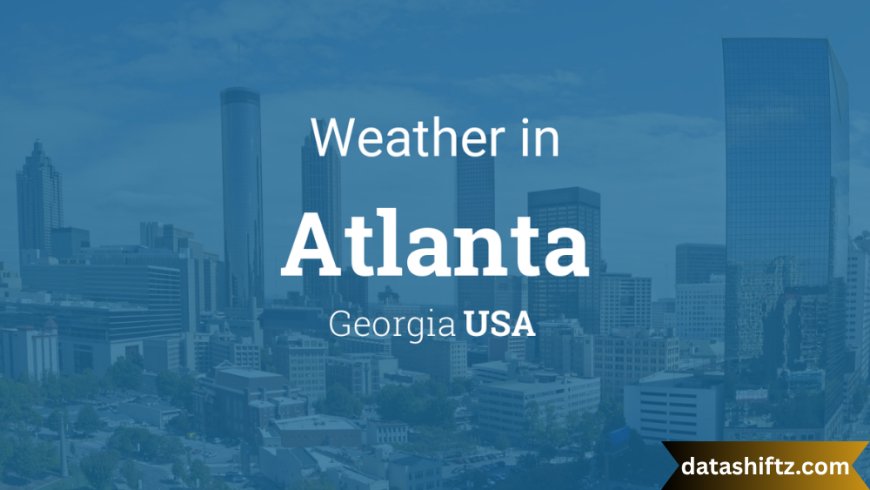Atlanta Weather: Seasons, Trends & Weather Wisdom

Introduction
Atlanta’s climate is classified as humid subtropical, offering four distinct seasons. Summers are long, hot, and humid with frequent thunderstorms, while winters are relatively mild with occasional cold snaps and light snow. Understanding the seasonal patterns, current conditions, and climate trends can help residents and visitors prepare for everything—from summer thunderstorms to rare winter ice.
Seasonal Climate Overview
Four Distinct Seasons
Atlanta experiences a full range of seasonal weather patterns:
-
Spring brings mild temperatures (highs in the 60s–70s°F) and frequent rain, including occasional severe storms and tornadoes.
-
Summer is hot and humid (mid-80s to upper 90s°F), with abundant afternoon thunderstorms and frequent heatwaves.
-
Fall offers crisp air and lower humidity, with mild temperatures (60s–70s°F) and a gradual decline in rainfall.
-
Winter sees cool temperatures (30s–50s°F), rare snow, occasional ice storms, and freezes.
Below is a table summarizing average monthly climate data:
| Month | Avg High (°F) | Avg Low (°F) | Rainfall (in) | Notes |
|---|---|---|---|---|
| Jan | 50–52 | 31–34 | 4.5–4.8 | Cool, occasional freezes |
| Apr | 72–73 | 50–54 | 3.4–4.3 | Showers, spring storms |
| Jun | 87–89 | 66–68 | ~4.5 | Hot, humid, thunderstorms |
| Jul | 89–91 | 68–71 | ~5–5.3 | Hottest, peak storms |
| Oct | 72–73 | 51–54 | ~3.1–3.9 | Mild fall, low humidity |
Summer 2025 Snapshot
Current Conditions & Week-Ahead Forecast
Atlanta is experiencing classic summer patterns:
-
Daily highs in the upper 80s°F, with heat index values exceeding 100°F
-
High humidity, with dew points around 68–70°F, making temperatures feel more intense
-
Afternoon thunderstorms nearly daily, especially June through August
This Week’s Forecast Highlights
Your daily weather guide, ideal for planning:
-
Thunderstorms likely each afternoon, from Sunday through Wednesday
-
Morning temperatures around 69–71°F, with rising muggy conditions midday
-
High heat index necessitates extra hydration and shade
Weather Trends & Climate Change
Warmer Nights & Rising Extremes
-
Nighttime temperatures have risen about 4 °F since 1970, exceeding national averages
-
Summers now start earlier, with prolonged heat and humidity generating more frequent storms
Rainfall Patterns
-
Annual precipitation roughly 50 inches, with late spring and midsummer (April–July) being wettest months
-
Peak July rainfall (~5 in) and widespread thunderstorms maintain green landscapes
Weather Impacts & Preparedness
What Locals Should Know
Atlanta’s weather presents unique daily and long-term challenges:
Essential Safety & Comfort Tips
-
Summer hydration & shade—stay indoors 10 a.m.–4 p.m.
-
Storm readiness—heavy rain/lighting risk; have shelter plans.
-
Heat safety—watch for heat exhaustion during outdoor exertions.
-
Winter weather—rare but impactful freeze/ice storms may disrupt roads.
-
Home systems—maintain AC and consider stormproofing during humid season.
Planning Around Weather
Seasonal Activity Guide
| Season | Best Activities | Weather Constraints |
|---|---|---|
| Spring | Outdoor festivals, BeltLine walks | Unpredictable rain, severe storm risk |
| Summer | Mornings at parks, evening outdoor dining | Avoid midday heat and storms |
| Fall | Football, fall foliage outings | Generally clear and pleasant |
| Winter | Indoor attractions, holiday events | Possible ice/disruption during freezes |
Final Thoughts
Atlanta offers a vibrant climate — tropical summers, refreshing falls, crisp springs, and mild winters. With growing nighttime warmth and intensified storms driven by climate change, it's important to:
-
Stay weather-aware with daily forecasts
-
Adapt activities to timing and season
-
Follow health and safety guidance during heatwaves or storms
Preparedness turns Atlanta’s diverse weather into an opportunity to enjoy its rich seasonal rhythms.





























